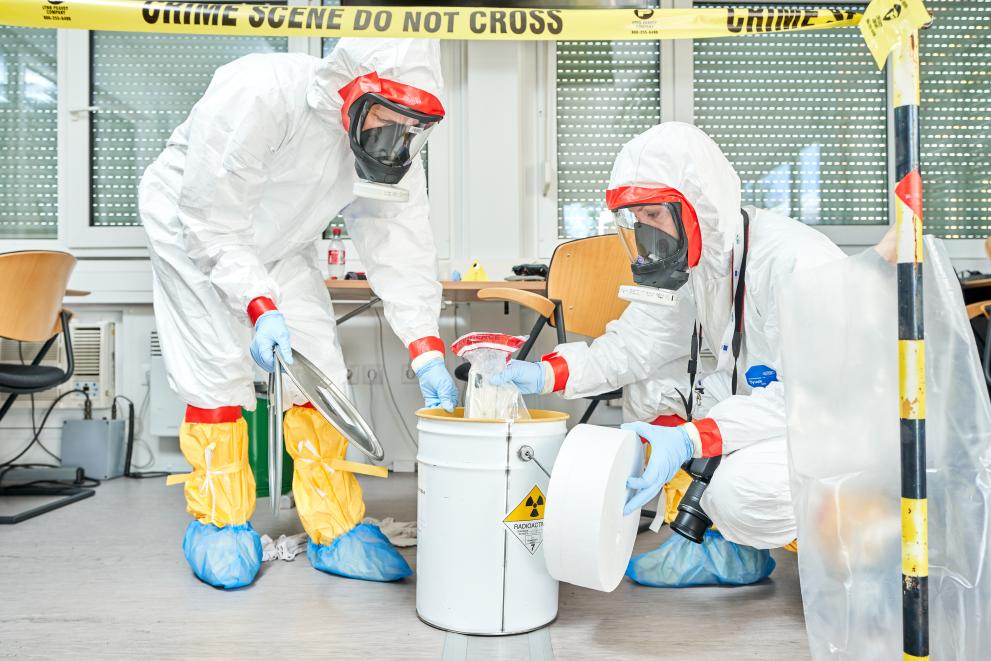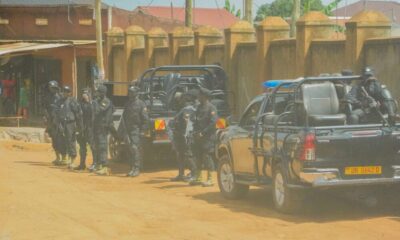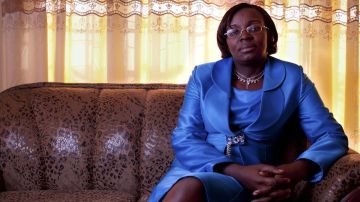
International Community Meets to Discuss the Future of Nuclear Security
Ministers, high-ranking officials, experts, and delegates from all over the world next week will convene in Vienna to deliberate on global nuclear security.
The International Atomic Energy Agency (IAEA) will host International Conference on Nuclear Security: Shaping the Future (ICONS 2024).
The IAEA’s Nuclear Security Series provides international consensus guidance on all aspects of nuclear security to support States as they work to fulfill their responsibility for nuclear security.
The conference under the theme “Shaping the Future” will focus on how to further strengthen global nuclear security and address challenges related to new risks, threats, and emerging technologies.
Uganda is among the countries that have embarked on preparation to put nuclear power stations as part of its energy security under the energy transition plan launched in Dubai last year.
The conference running from the 20th to the 24th comes after delegates at the UN Climate Change Conference in Dubai agreed that nuclear should be the green energy source as the world shifts away from fossil fuel.
IAEA Director General Rafael Mariano Grossi in a statement said, “Nuclear security is about more than preventing nuclear terrorism. It is about providing clean energy, cutting-edge medicine, nutritious food, and hope for a better tomorrow,” said Grossi “The IAEA is where the world comes together to make sure we keep making that possible.”
As the world’s only international conference on nuclear security with a ministerial and a scientific component, ICONS 2024: Shaping the Future will provide a global forum to discuss the future of nuclear security while providing opportunities for exchanging information, sharing best practices, and fostering international cooperation.
The conference will comprise two segments: a two-day ministerial segment featuring national statements, interactive sessions and high-level policy discussions for Ministers.
The four-day scientific and technical program will start in parallel with the second day of the ministerial segment and includes daily plenary panels with invited speakers, high-level policy discussions, and parallel technical sessions.
Tim Watts, Assistant Minister for Foreign Affairs of Australia and ICONS Co-President said a strong and sustainable nuclear security system has never been more imperative.
“ICONS 2024 will bring together Ministers, policymakers, and technical and legal experts, to renew and strengthen collective nuclear security commitments. I’m excited to see countries come together to drive the nuclear security agenda forward and tackle the challenges ahead,” said Watts. Diving into nuclear security.
Watts says nuclear science and technology can make a considerable difference in people’s lives.”Their development enables us to address some of the most pressing challenges of our time, including those related to health and wellbeing, and food security,” he said. “As a world-leading producer of nuclear medicines to diagnose and treat cancer and other diseases, Australia recognizes the important role of nuclear security in facilitating the peaceful uses of nuclear technology. On average, every Australian will need at least two nuclear medicine procedures during their lifetime” he added.
He further noted that “As the world continues to leverage nuclear science and technology, we must ensure that nuclear security standards are upheld to prevent the exploitation of this technology for harmful purposes,”
As part of a comprehensive programme, experts will discuss a wide range of technical and scientific nuclear security topics.
These include global perspectives on nuclear security regulations for small modular reactors, the role of nuclear forensics in bolstering international nuclear security, practical uses and potential threats of artificial intelligence, preparing for and defending against cyber-attacks to sensitive infrastructure and developing national strategies for nuclear security events.
The conference boasts record-breaking participation with over 700 abstracts submitted, spanning four key thematic areas including policy, technology, capacity building, and cross-cutting nuclear security topics, such as communication and safety-security interface, among others.
“ICONS 2024 is a major event for the global nuclear security community and comes at a critical time for international nuclear security. Despite some risks and challenges — from climate change and natural disasters to global pandemics — artificial intelligence products and advanced computing technologies offer new opportunities to strengthen nuclear security regimes,” says Sungat Yessimkhanov, Vice-Minister of Energy of the Republic of Kazakhstan.
The programme includes the inaugural “Nuclear Security Delegation for the Future” which will convene in person, providing 24 selected delegates from more than 200 applicants in the field of nuclear security the opportunity to present the results of their deliberations conducted over the previous weeks leading up to the conference. ICONS 2024 is the fourth conference in this series.
Previous ICONS were hosted by the IAEA in 2013, 2016 and 2020. The conference is supported by funding from Australia, Canada, the Republic of Korea, Pakistan, Switzerland, the United Kingdom, and the United States of America.
**URN**
Post Views:
1,008
International Community Meets to Discuss the Future of Nuclear Security
News
Ugandan Citizen Abducted, Held in Secret Detention for Three Months, Sparks Outrage and Calls for Justice

A disturbing new case of unlawful detention has surfaced, highlighting the ongoing human rights crisis in Uganda. A Ugandan citizen was reportedly abducted and held in a secret facility, known as a “safe house,” for three months, only to be released without charge or explanation. This incident, reported by NTV Uganda, has sparked widespread condemnation and renewed calls for accountability regarding human rights abuses in the country.
While the details surrounding the abduction remain unclear, reports indicate that the individual was taken without due process and held incommunicado—an action that has long been condemned by human rights organizations. The victim’s release, with no charges filed and no clear justification, has angered activists and citizens, who view this as yet another case of egregious abuse of power by the state.
“This is a recurring pattern,” said one human rights activist. “Abductions, secret detentions, and unexplained releases have become all too common in Uganda. These acts violate fundamental human rights and erode public trust in the justice system.”
The use of “safe houses,” unregistered detention facilities reportedly operated by security forces, has been a focal point in numerous allegations of torture and illegal imprisonment. Despite repeated calls from both local and international organizations for their closure and accountability for those involved, little action has been taken to address these violations.
This case underscores the urgent need for reform within Uganda’s security apparatus and greater accountability for human rights abuses. Observers hope that drawing attention to these injustices will spur concrete action to bring those responsible to justice and ensure the protection of basic human rights.
As frustration mounts, calls for both domestic and international pressure to hold the government accountable for such crimes grow louder. “One day, there must be accountability for all these crimes against our people,” stated one social media user, reflecting the sentiments of many Ugandans.
News
NUP Gathering Disrupted: Kyagulanyi Alleges Security Force Harassment and Arrests

National Unity Platform (NUP) President Robert Kyagulanyi has accused Ugandan security forces of using excessive force to disrupt a planned NUP gathering. The allegations were detailed in a statement shared on Twitter, following an event held to honor children of NUP supporters who were killed, disappeared, or detained for their political beliefs.
According to Kyagulanyi, security personnel, under the command of an officer identified as Asiimwe, carried out a preemptive operation early in the morning upon learning of the NUP’s plans. The forces allegedly stormed the premises, arrested workers, and deployed tear gas to disperse those present.
“The criminals under the command of one Asiimwe deployed early morning, arrested our workers, and threw tear gas into our premises. They’ve cordoned off the premises and blocked all people from accessing the place,” Kyagulanyi wrote.
Among those reportedly arrested were Saava Peter, Mudenya Samson, and Turyasingura Samson. Kyagulanyi claimed the detained workers were subjected to beatings and interrogated about their political affiliations, with security operatives labeling them as terrorists.
“These JATT operatives asked the workers who they support politically, branding them terrorists and criminals—their only crime being that they work with us. You can imagine the indignity!” Kyagulanyi lamented.
This incident adds to the growing tension in Uganda’s political climate, where opposition parties frequently accuse the government of stifling dissent. Despite the challenges, Kyagulanyi ended his statement with a message of defiance and optimism, proclaiming, “UGANDA WILL BE FREE.”
NUP Gathering Disrupted: Kyagulanyi Alleges Security Force Harassment and Arrests
News
Sudan Demands Apology from Uganda Over Army Chief Muhoozi Kainerugaba’s Threat to Invade Khartoum

Sudan has demanded an official apology from Uganda over “offensive and dangerous” comments made by the chief of Uganda army staff, who threated to invade Khartoum, the Sudan Tribune has reported.
General Muhoozi Kainerugaba, son of Ugandan President Yoweri Museveni and CDF of the Ugandan army, posted two comments on the X platform on Tuesday in which he threatened “to capture Khartoum” with the support of the US President elect Donald Trump after he takes office. The posts were deleted later.
“The government of Sudan demands and official apology from the Ugandan government for the offensive and dangerous comments of the army commander,” Sudan’s foreign ministry said in a statement that the Sudan Tribune said it has seen.
Sudan Demands Apology from Uganda Over Army Chief Muhoozi Kainerugaba’s Threat to Invade Khartoum








